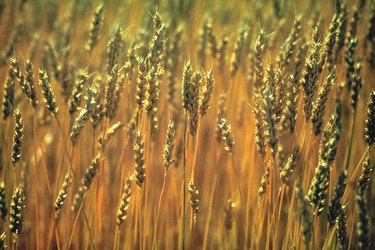
The cells of your body -- aside from sperm or eggs -- have two copies of each chromosome -- two copies of chromosome 1, two copies of chromosome 2 and so forth. That makes you a diploid organism. Many plants, however, have more than two copies of each chromosome. This feature is called polyploidy, and it can play some interesting roles in plant evolution.
Size
Video of the Day
According to "Genetics: A Conceptual Approach," the volume of each cell in a plant often seems to be correlated with the volume of its nucleus. The larger the genome, the larger the nucleus, and hence the larger the cell. Many polyploid plants have bigger cells and are bigger overall than their diploid relatives. Sometimes plant breeders have taken advantage of this phenomenon in their quest to breed plants with larger leaves and fruits.
Video of the Day
Heterosis
Breeders have often found that crossing two lines results in superior progeny because of an advantageous combination of genes from both parents. This effect is called heterosis or hybrid vigor. Polyploidy can help to enhance this effect, because it ensures that future generations will continue to exhibit heterozygosity (a condition where the organism has different copies of a given gene inherited from its parents). According to a review in Nature Reviews Genetics, some evidence suggests that certain types of polyploid plants show greater hybrid vigor than their diploid relatives.
Gene Redundancy
Plants can inherit not only beneficial genes from their parents but also potentially harmful ones as well -- much like genetic disorders in humans. Polyploidy can help mitigate the effects of these conditions, because the organism inherits multiple copies of each chromosome and hence multiple copies of each gene. If the organism inherited "good" copies of the gene along with "bad" ones, the greater number of copies increases the chance the effects of the "bad" copy will be masked by the others.
Self-Fertilization
Polyploidy helps plants overcome some of the normal barriers that prevent self-fertilization. According to a paper in Nature Reviews Genetics, it's not entirely clear how this works at the molecular level, although there's definitely an association between polyploidy and the ability to self-fertilize in some species of plants. Polyploidy is also sometimes associated with asexual reproduction -- the ability to reproduce without a partner. Both asexual reproduction and self-fertilization can sometimes be advantageous for plants.